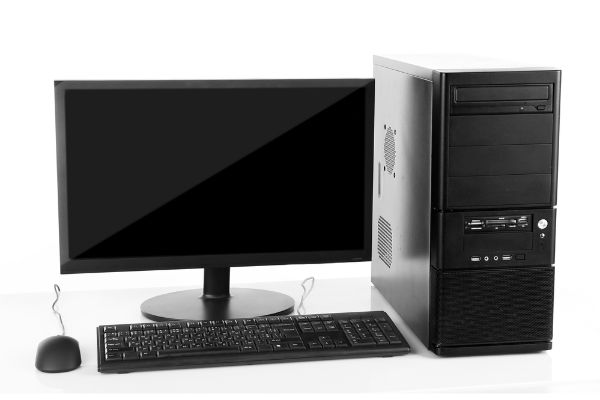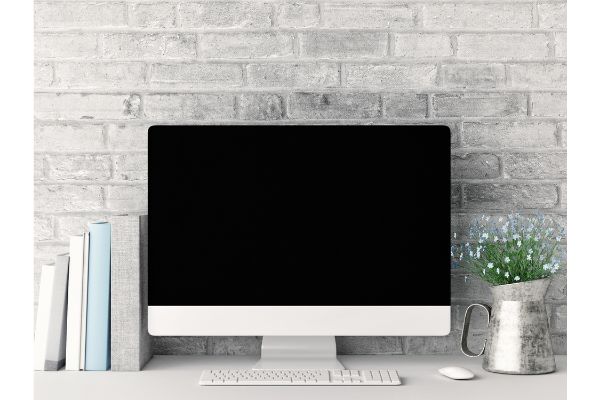Disclaimer: This post may contain affiliate links, meaning we get a small commission if you make a purchase through our links, at no cost to you. For more information, please visit our Disclaimer Page.
Desktop computers are one of the two main types that most people will think of when they envision such a device. Your typical desktop includes a tower that contains all the hardware, a monitor, and peripherals that the user can manipulate in order to control programs in the system.
The most common ones in this last category are the keyboard and the mouse. Although computers have come a long way from the days in which they filled whole rooms with banks as large as filing cabinets, some people think desktops are still quite big, especially in comparison to their laptop counterparts.
Many desktops are indeed quite large, though there are different tower form factors that can make some of them smaller than others. While there is no single reason why desktops are still big today, we will try to pin down some of the common possibilities in our article here.
In doing so, we can try to explore the various reasons why people still seem to buy desktops over laptops, including some of the perceived advantages and problems inherent in the design of most desktops. To wrap things up, we will also ponder whether desktop computers will ever become a thing of the past.
Table of Contents
Why Are Desktops So Big? 5 Reasons
If you ask the tech community at large, you will get various answers to this question. However, we can provide some insight into some of the most common reasons people are likely to cite:
1. Desktops are modular in their design. They are relatively easy to open up, tinker around in, and swap out one part for another. While some technical knowledge is necessary for any of this, the design of a typical desktop makes it one that you can customize.
Although this might be true for a few things on a laptop, most developers do not make them with the same level of customization in mind.
2. Many desktops can handle bigger, more powerful components than some of their laptop cousins. More powerful hardware tends to be bigger in physical size than parts that are less so. A bigger case is something you will need in order to accommodate these parts. You may be able to find some laptops that equal some desktops in terms of power, but their lack of flexibility makes them harder to upgrade.
3. On a related note, bigger, more powerful parts need better cooling options. In particular, the central processor and the graphics processor can get very hot when they are working hard to make your applications run smoothly. The hotter these parts run, the more cooling they need in order to avoid overheating. Coolers for desktops are some of the largest parts that need to go inside the case.
4. Some of the space inside a desktop tower is empty space. You can use this to upgrade the system and give it more powerful, larger pieces of hardware. Without some room to grow, you would need to buy whole new towers to make some upgrades. The empty space makes some desktops seem bigger.
5. Moving away from the tower itself, computer monitors for desktops can be as large as you would like. Laptops have screen sizes that rely on the physical size of their cases, but a desktop can hook up to a monitor that is as big as the market provides. The same is true for peripherals, and how you might choose to set up those items.
These are not the only reasons why desktops are large today, but this list represents some of the common factors that can help a person determine the right size of desktop for their needs. In the computing world, more size equals more power, and more power means more flexibility to do things with your system.
For example, you can find a laptop that equals or exceeds the power of an economical desktop that one might only use for email, some web surfing, and other light work. However, on balance, even the most powerful laptop available cannot beat a desktop with the best hardware a PC can have.
Why Do People Buy Desktops Instead of Laptops?
In today’s fast-paced world, portability is a big advantage in computers. It allows us to take a lot of our work or entertainment with us on a single system. There is minimal setup, and what else we might want to connect to a laptop is easy enough to accommodate through USB ports.
However, there are still people who prefer the more stationary desktop versions over a decent laptop. Much like the previous question, answers here can vary from one user to the next. However, we can probably boil all of the secondary reasons down to one primary motivation, and that is power.
Along with that, many of these same users simply may not have a need for a more portable computing system. Portability is one of the main advantages of the laptop over the desktop, but there is less incentive to purchase the former if you don’t need to take your computer anywhere.
Even a large company that might provide its employees with laptops for work at a different site will probably buy several desktops that it can network together. This is because many businesses do a lot of work on the premises, and there it might be easier for workers to streamline their efficiency when they type on a standard desktop.
There are also ways to sync desktop and laptop work in case one does need to take some assignments home with them.
Similarly, many people who don’t work in an office setting might still do most of their tasks at home. If they don’t need to go to other physical locations for meetings, it makes sense to just do everything on a home desktop model. They get all the power they need, room to spread out their peripherals, and they also have the option to keep upgrading the system if they ever need to run newer, more intense programs.
What Are the Advantages & Disadvantages of Desktop Computers?
Although this question is somewhat similar to our last one, it is important to list some of the other ways that desktops might excel. This way, we can juxtapose those reasons against some of the common disadvantages to owning a computer of this type over a laptop.
Primarily, we discussed the power and flexibility of desktop systems already, but there are a few other advantages to them.
Pros of a Desktop
1. On balance, a desktop with the same specs as a particular laptop model should still be cheaper to buy than its more portable counterpart. Of course, you’ll still need to add some peripherals to the base cost of the desktop. However, this kind of computer still ends up being less expensive than most laptops running similar hardware.
2. Similarly, you can still buy a simple laptop for times when you actually need portability, and you can do it with the savings you get from buying your desktop.
3. You can still get powerful all-in-one desktops that do away with big towers or lots of messy wires while providing you with some great hardware.
4. Desktops tend to use larger peripherals such as a keyboard, and these form factors can make work easier than the kind you might do on a laptop.
5. For some applications, desktops can make things easier. Typing, manipulating objects for fine work, and other things might be physically easier for desktop users.
On the other hand, there are some cons to desktops, too.
Cons of a Desktop
1. They take up more space, but they are also harder to move. With a laptop, you can always close and move it out of the way to make room for other things. This is a much more laborious process with a desktop.
2. Laptops use special batteries that make sure you don’t need a dedicated power source all the time. With desktops, they need to have a power source nearby in order to work. Although you can install an uninterruptible supply for your desktop, this requires more parts and money in order to do so, reducing the overall value you get.
3. Similarly, your overall power usage with a desktop might be greater than it would be if you were using a laptop. You might keep your desktop connected to power all the time, and it may be on and active even when you don’t need to use it. This can consume more power.
Will Desktops Ever Go Away?
People might be moving toward laptops and other portable computers more these days, but it is still too early to say whether desktops will go away entirely in the near future. With the ways that technology advances, this is always a possibility.
However, the sheer power and performance that most desktops offer means that, for now, they are here to stay. High-end workstations for critical business can’t maintain that on laptop hardware alone, for the most part.
Additionally, although gaming laptops exist, if you want the best features that this industry has to offer, you’ll go for a desktop computer.
Once manufacturers can find a way to make some of the most powerful components even smaller and less reliant on big coolers, we may see some desktops start to disappear slowly.
Conclusion
Desktops are not as portable as their laptop counterparts, so it is much easier for manufacturers to make them in larger form factors. Because laptops exist, the standard desktop rig isn’t something a user will move, giving developers less incentive to make smaller devices in desktop form.
Furthermore, desktops need to be bigger in order to fit a lot of the larger, more powerful versions of parts that you won’t find on a laptop.
Part of the hardware that needs to be bulky is the cooling system that keeps the rest of the unit from heating up too much. This extra room also gives desktop owners more opportunities to upgrade their systems to meet their preferences.


